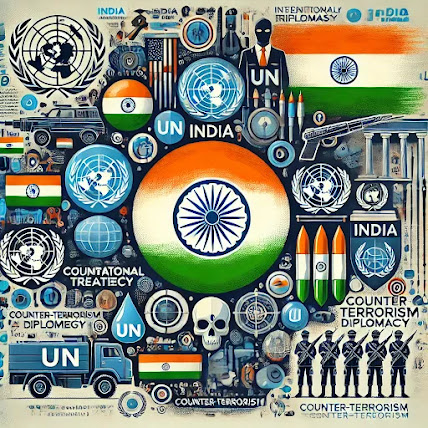India’s Role in International Law and Diplomacy: Leading Global Efforts in Counter-Terrorism and Environmental Treaties
Introduction: Why India Matters in Global Diplomacy
India plays a critical role in shaping international law, particularly through its involvement in global diplomacy. As a rising power, India balances its developmental goals with international legal commitments, making it a key player in global governance, especially in areas like counter-terrorism and environmental protection. This article explores how India’s diplomatic and legal efforts influence these areas and its significance on the global stage.
Table of Contents
1. India’s Role in Global Diplomacy
2. Counter-Terrorism Diplomacy
- India’s Legal Framework for Counter-Terrorism
- India’s Participation in Global Counter-Terrorism Treaties
- Case Study: 2008 Mumbai Attacks
3. India and Environmental Diplomacy
- India’s Domestic Environmental Laws
- India’s Role in International Environmental Treaties
- Challenges and Opportunities in Sustainable Development
4. Conclusion
5. FAQs
India’s Role in Global Diplomacy
India’s approach to diplomacy is centered around bilateral and multilateral cooperation, contributing significantly to international legal frameworks. As a prominent member of global organizations like the United Nations (UN), World Trade Organization (WTO), and International Court of Justice (ICJ), India has become a key player in global decision-making. Its diplomatic ties with major powers like the United States, Russia, and China further cement its role in shaping global governance.
South-South Cooperation and Regional Diplomacy
India’s leadership in South-South cooperation—involving countries like Brazil, South Africa, and Russia—reflects its commitment to fostering regional and global collaboration. India’s involvement in groups like BRICS and SAARC promotes collective growth and development, particularly in trade, security, and economic stability.
Counter-Terrorism Diplomacy
India’s Legal Framework for Counter-Terrorism
Terrorism poses a significant threat to India. The country has developed robust legal frameworks to combat it, including the Unlawful Activities (Prevention) Act (UAPA) and the National Investigation Agency (NIA). These laws align with international standards to ensure that India’s domestic anti-terrorism strategies complement global efforts.
India’s Participation in Global Counter-Terrorism Treaties
India is actively involved in international counter-terrorism treaties, such as:
- Comprehensive Convention on International Terrorism (CCIT), an Indian-led initiative.
- UN Global Counter-Terrorism Strategy, where India advocates for stronger global cooperation.
India’s involvement in the Financial Action Task Force (FATF) also helps combat terrorism financing, further strengthening its global leadership in counter-terrorism.
Case Study: The 2008 Mumbai Attacks
The 2008 Mumbai attacks marked a pivotal moment in India’s counter-terrorism diplomacy. Following the attacks, India worked with global platforms like the United Nations to push for sanctions against individuals and organizations involved in the attacks. These diplomatic efforts were instrumental in garnering international support for India’s counter-terrorism agenda.
India’s Role in Environmental Diplomacy
India’s Domestic Environmental Laws
India faces unique challenges in balancing rapid economic growth with environmental protection. To address these challenges, India has enacted several critical environmental laws, including:
- Environment Protection Act (1986), which regulates pollution and promotes environmental sustainability.
- Forest Conservation Act (1980), aimed at protecting India's forests and biodiversity.
India’s ambitious National Solar Mission and targets of achieving 450 gigawatts of renewable energy by 2030 reflect its commitment to environmental sustainability and global leadership in clean energy.
India’s Participation in International Environmental Treaties
India is a signatory to key international environmental treaties, demonstrating its commitment to global environmental governance. These include:
- Paris Agreement, aimed at reducing global greenhouse gas emissions.
- Convention on Biological Diversity (CBD), focused on biodiversity conservation.
- United Nations Framework Convention on Climate Change (UNFCCC), which sets targets for reducing global emissions.
India’s active participation in the 2015 Paris Climate Conference showcases its leadership in balancing economic development with environmental goals, advocating for equitable solutions for developing nations.
Challenges and Opportunities in Sustainable Development
While India’s rapid industrialization presents environmental challenges such as pollution and deforestation, it also provides opportunities for the country to lead in global environmental governance. India’s leadership in the International Solar Alliance (ISA), which promotes the use of solar energy, reflects its proactive role in addressing global environmental concerns.
Conclusion
India’s diplomatic efforts in international law and diplomacy, particularly in counter-terrorism and environmental governance, position it as a global leader in shaping international legal frameworks. By developing strong legal frameworks and engaging in proactive diplomacy, India plays a critical role in addressing some of the world’s most pressing issues. As global challenges continue to evolve, India’s diplomatic efforts will remain crucial in fostering cooperation and ensuring a sustainable and secure future.
FAQs
1. What is India’s role in global counter-terrorism?
India actively participates in international counter-terrorism efforts through its legal frameworks like the UAPA and initiatives such as the CCIT and FATF, contributing significantly to global security.
2. What are India’s commitments to global environmental treaties?
India is a signatory to major environmental agreements such as the Paris Agreement and the UNFCCC, playing a critical role in global environmental diplomacy.
3. How does India balance economic growth with environmental protection?
Through legislation like the Environment Protection Act and initiatives such as the National Solar Mission, India aims to balance rapid economic growth with sustainable environmental practices.






0 Comments